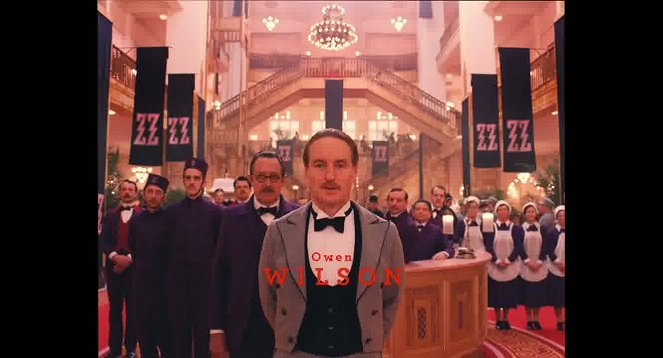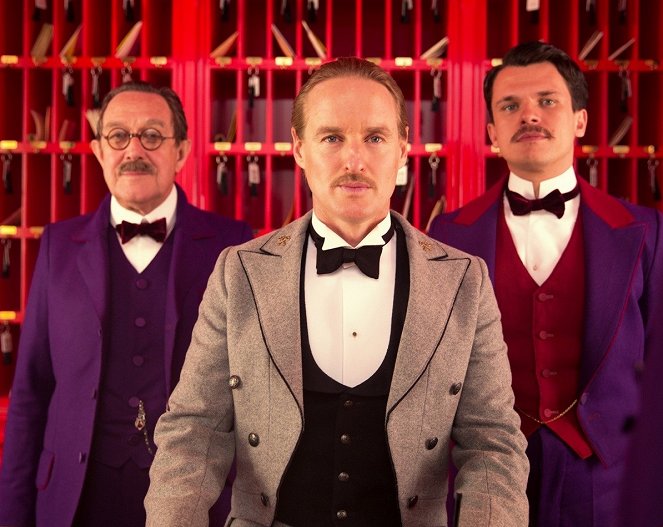Director:
Wes AndersonGuión:
Wes AndersonCámara:
Robert D. YeomanMúsica:
Alexandre DesplatReparto:
Ralph Fiennes, F. Murray Abraham, Mathieu Amalric, Adrien Brody, Willem Dafoe, Jeff Goldblum, Harvey Keitel, Jude Law, Bill Murray, Edward Norton (más)Streaming (3)
Sinopsis(1)
Narra las aventuras de Gustave H (Ralph Fiennes), un legendario conserje de un famoso hotel europeo y Zero Moustafa, el chico del vestíbulo con quien entabla amistad y convierte en su protegido. La historia trata sobre el robo y la recuperación de una pintura renacentista de valor incalculable y sobre la batalla que enfrenta a los miembros de una familia por una inmensa fortuna. Como telón de fondo, los levantamientos que transformaron Europa durante la primera mitad del siglo XX. (20th Century Fox España)
(más)Videos (15)
Reseñas (19)
Un divertido libro para colorear, tradicionalmente supremamente original de Anderson. Una historia atrapante de personajes interesantes, narrada con un buen ritmo e interpretada por un gran equipo de actores. Me alegro de que la película también haya sido un éxito comercial en los cines de EE. UU., porque su creador único se lo merece.
()
La peculiar y original poética de Wes Anderson sigue provocando risas, emociones y una experiencia de calidad para el público. Ralph Fiennes brilla literalmente en el papel principal, mientras que los demás actores de reparto tienen más o menos espacio. Las películas de Wes Anderson no son para todos, pero estamos convencidos de que hace mucho tiempo ha creado su numeroso grupo de fanáticos. Proyección de ČSFD, Cine Atlas, 13 de marzo de 2014.
()
The cardboard world of Anderson's childish fantasy hooked up with a script someone dug up in Alfred Hitchcock’s forgotten archives, and I’ve definitively succumbed to this fool whose films I both liked and loathed at the same time. While it doesn't really have human emotions, but rather forcefully screwed-on tremors based on the situation the characters are in at the time, this thriller ride is as tense as anything else. The elevator scene at the end and the subsequent shootout in the gallery are both scenes that few people can really film today. PS: Most directorial aces would sell their souls for this casting.
()
Wes Anderson is a director with his own world. I’ve seen his world a few times before and I never liked it as much as I did in this movie. It may have been caused by the atmosphere of the Second World War, but I rather think it was the absurdity as such, that the director toys with in this war. It’s a bit like Tarantino’s Inglorious Basterds, only in the far more distinctive and positive style of the director, which I’ll probably never forget. And I have to admit, after watching this movie, I immediately have a reason to watch all his other movies I’ve seen before, but also the ones I haven’t seen yet. That’s how much The Grand Budapest Hotel affected me.
()
A lot of figures, no characters. A lot of narrators, no narrative. A lot of movement, no direction. Anderson again balances on the edge of a chasm of gratuitous horsing around in grand style. The design of the individual settings and periods (red and purple art deco in the 1920s, grey and pink during the Nazi era, orange and yellow in the 1960s), the geometric perfection in the mise-en-scene and the seemingly hand-crafted tricks make up an unbelievably entertaining blend of the poetics of classic slapstick and Méliès’s more spectacular films. (A detail for connoisseurs is the fact that each era was shot in a different aspect ratio: 1.85:1 for the present, 2.35:1 for the 1960s, academic format for the 1930s). However, I don’t agree that Anderson has matured and has given us a sad and melancholic film in colourful wrapping. Any attempts at seriousness fail, whether in relation to the characters or to the theme of war and times long past. The war context, the hint of nostalgia and the multiple rewritings of Central European history serve mainly as an excuse for colourful fooling around. Zweig is present more or less thanks only to the nesting-doll structure of the narrative, the infrequent consideration of which over the course of the film raises a question that I had to ask myself repeatedly, despite my desire to let myself be freely carried away by Anderson’s imagination – “What is this for?” According to the principle of “why do something the easy way when you can do it the hard way”, the film contains a full range of prototypical situations that we would find in their unaffected form, which would better serve the story, in classic escape and caper movies. The acknowledged inspiration taken from Hitchcock’s thrillers (a persecuted innocent) and Lubitsch’s screwball comedies from obscure European countries (particularly Ralph Fiennes’s character and his attitude toward women, but not the “cleverness” of the dialogue, whose humour rather often consists in a wager on a sure thing in the form of well-timed vulgarity) is purely superficial. The intentional contrivance of the situations finds a response only in the actions of the characters, who respect strict rules and walk in diagonal lines, thus elegantly closing the circle, as the contrived world gives meaning to its lifelessness through artificial figures. I admire the precision with which Anderson builds his worlds and I enjoy the flawless comic timing of all of the actors, but I simply cannot find any deeper meaning, greater depth or narrative imaginativeness in Grandhotel Budapest. 75%
()



Anuncio